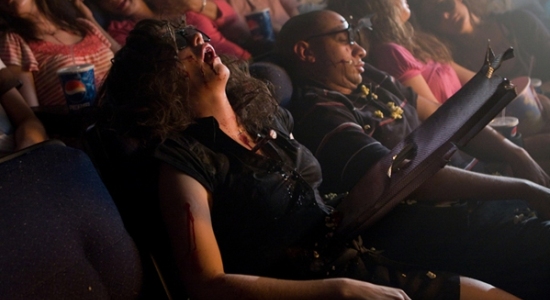
I’ve got to hand it to the creative minds behind The Final Destination. So far, every chapter in the (as opposed to the The) Final Destination series has featured death as its principal antagonist, but only with this fourth one did I feel a part of me die as the credits rolled. Its moniker alone should be enough to make a person’s head explode. I get that the franchise has got one sequel too many to insert “3D” in the title, but is a pun-free numeral really so heinous that we had to resort to perfunctory determiners?
Besides, it’s not like director David R. Ellis does anything neat with the 3D gimmick. Consider the opening sequence, in which a Nascar pileup bleeds into its eager audience. The previous instalments gave us a plane explosion, a highway collision, and a rollercoaster crash, all tragedies about which anyone could read in the papers and exclaim, “My God, that could have happened to me last week!” I don’t think you could say the same of this one unless you were Jeff Foxworthy. More to the point, if you’re going to spend millions of dollars for an extra axis on which to slaughter obnoxious teens, you should show more creativity than to just have random things drop on their heads.
In fairness, the demises get marginally more imaginative once Nick (Bobby Campo) wakes up from his premonition. By now, fans ought to know the formula by heart: fueled by his glimpse into the future, our hero convinces a handful of people to leave the site, thus averting their deaths, but the Grim Reaper retaliates by slaughtering them one by one by way of convoluted Rude Goldberg devices themed after popular urban legends. It all leads to an inspired climax at a 3D movie screening, one I wish screenwriter Eric Bress had used as the opening set piece. Sure, the scenario would have proven as unlikely at the beginning of the movie as in its final act, but that one clever bit of self-reflexivity might have helped carry us through an hour and a half of by-the-numbers plotting.
The Final Destination applies the series template rather rigidly, you see, moving from one gruesome kill to the next by way of awkward and largely perfunctory exposition. I guess what it comes down to is that I don’t like the victims or remotely believe in them. I mean, how can these people behave so casually after everything that’s happened, and where are their families? Only three characters held my interest: a suicidal widower named George (Mykelti Williamson), the heroic protagonist Nick, and his girlfriend Lori, whom I include despite Shantel Van Santen portraying her with all the range of a dry log because I care more for chopped wood than for the legion of cannon fodder archetypes populating this movie.

Simply put, there are far too many death scenes (gore) in The Final Destination and not enough close calls (suspense), making for a tediously repetitive and predictable experience. I like the first bit in the beauty parlour, but a new pattern soon emerges as, over and over again, the characters spend all their efforts warding off one threat only to get nailed by an unrelated hazard that breaks every law of physics. Usually, it involves the victim’s flesh getting sucked through tiny holes. Freud would’ve had a field day, though he might have wondered whether the filmmakers know the human body isn’t made out of pudding.
Ellis and Bress surely must. They helmed Final Destination 2 (2003), which boasts some of the best set pieces in the series. Unfortunately, the only thing their new brainchild has inherited from the appropriately titled sequel is its callous outlook on mortality. Taking puerile cynicism to chilling new heights, The Final Destination treats death as one big, mean-spirited joke, inviting us to laugh at the poor saps getting smooshed into meat McFlurrys. Take, for instance, the final twist, which trades our sense of catharsis for a final “neener-neener” moment, one that openly contradicts the previous instalments no less.
The first Final Destination (there’s an interesting oxymoron for you) in 2000 centered on an earnest discussion of fate, God, mortality, and our shared feeling of powerlessness against the universe. Sure, it did it by way of flying body parts and recycled slasher tropes, but, dang it, it did it well enough to still resonate three sequels later. By comparison, The Final Destination feels like it’s got a vacuum for a spirit. I wrote the following reproach in my notes: “The producers think this will do?!” In light of the film’s commercial success, I’d venture to say they were right, and I just felt another part of me die.






Recent Comments